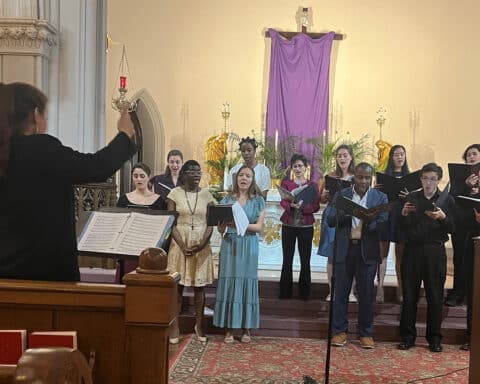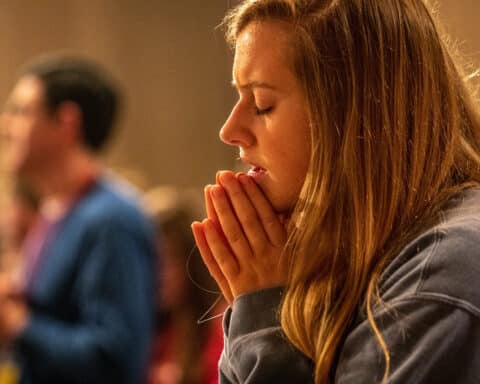The following talk was delivered by Gretchen R. Crowe, editorial director for periodicals at OSV, at the Holy Family Celebration at the Saint John Paul II National Shrine on Feb. 15.
Good afternoon.
It is an honor to be here with you today, and I am grateful to my co-presenter, Dan, and to all at this beautifulSt. John Paul II National Shrine for having me.
I can think of no better way to spend an afternoon than to talk about family prayer, the Rosary and St. John Paul II. My mission today is simple: to share with you the beauty, joy and peace that come from family prayer, especially in the form of what St. John Paul II called his “favorite prayer” — the most holy Rosary.

In one of his very first general audiences as pope in 1978, St. John Paul II called the Rosary a “marvelous prayer” — marvelous in its simplicity and in its depth, and I think both of those attributes make it the perfect prayer for families. The Rosary is simple enough so that even young children can follow along, and perhaps even join in. And it’s deep enough so that it offers endless opportunities for spiritual growth — especially for married couples.
Venerable Father Patrick Peyton, the founder of Holy Cross Family Ministries who spent his life proclaiming the benefits of the Rosary (so much so that he was known as “the Rosary priest”), was well-known for the phrase, “the family that prays together, stays together.” In recent years, many studies have been conducted that show that couples who pray together, every day, have a statistically infinitesimal chance of getting divorced. Really. It’s like .059 percent or something incredible like that. Just for taking a few minutes every day to pray with your spouse.
Now, I know sometimes this is easier said than done. My husband and I have two littles — Joseph will be 3 in May and Anne Therese — or “Baby Annie Miss,” as her big brother calls her — will be 9 months old next week. I work full time outside the home, and my husband, who stays home with the kids, works nonstop. We both write and edit for Our Sunday Visitor. We both currently are writing books. Like so many of you, what little free time we have is spent just trying to stay afloat. Prayer sometimes takes a back seat. But I can say with confidence, and I can imagine that many of you would agree, that we know when we are praying together regularly as a couple and when we have lapsed. There is a peace that comes when spouses pray together — when families pray together — that just isn’t there when daily prayer is missing.
In his 1994 Letter to Families, Pope John Paul II wrote that, “Prayer increases the strength and spiritual unity of the family, helping the family to partake of God’s own “strength”. When families pray together, John Paul was helping us to understand, the more united to one another — and to Christ — we will be. When family prayer is looked at in this way — as a source of strength and spiritual unity — that miniscule divorce rate for couples who pray together daily becomes much easier to understand and to believe.
John Paul continued in his Letter to Families: “Prayer needs to become a regular habit in the daily life of each family. Prayer is thanksgiving, praise of God, asking for forgiveness, supplication and invocation. In all of these forms, the prayer of the family has much to say to God. It also has much to say to others, beginning with the mutual communion of persons joined together by family ties.”
In other words, he is telling us, prayer fits naturally within the life of the family, if only we seek out the opportunities.
St. John Paul II explains this more in Familiaris Consortio, a document from the early 80s that centers on the family in the modern world.
“Family prayer has for its very own object family life itself, which in all its varying circumstances is seen as a call from God and lived as a filial response to His call. Joys and sorrows, hopes and disappointments, births and birthday celebrations, wedding anniversaries of the parents, departures, separations and homecomings, important and far-reaching decisions, the death of those who are dear, etc. — all of these mark God’s loving intervention in the family’s history. They should be seen as suitable moments for thanksgiving, for petition, for trusting abandonment of the family into the hands of their common Father in heaven. The dignity and responsibility of the Christian family as the domestic Church can be achieved only with God’s unceasing aid, which will surely be granted if it is humbly and trustingly petitioned in prayer.”
If regular family prayer isn’t a habit yet for you and your family, don’t despair! Dan and I will be offering some practical tips at the end of this talk to help jumpstart your family’s prayer life. If you’re already going strong, congratulations and keep it up. I’d love to hear, during our question and answer period, some of the ways you manage to prioritize family prayer amid busy family life. We have so much to learn from one another, and I don’t pretend to have all the answers.
OK. So now that we’ve covered why families should pray together, let’s move on to why families should pray the Rosary together. What benefits can this centuries-old devotion have for family life?
Let’s think about some of the challenges to family life in the early 21st century. In my book “Why the Rosary, Why Now?“, I outline eight reasons why the Rosary is needed in today’s world. I’m going to focus on three of them that I think pertain strongly to family life.
First; we need the Rosary to strengthen families.
Second, we need the Rosary to break through the noise — the cacophony really — that follows us wherever we go these days.
And finally, we need the Rosary to help us get to heaven — what should be the goal of each of us, our truest calling.
So, first: we need the Rosary to strengthen families. Before I explain how, let me start with a little context — a look at the “why?” In 2015, a study by the Center for Applied Research in the Apostolate at Georgetown University, done in conjunction with Rosary priest Father Patrick Peyton’s Holy Cross Family Ministries, gives us the following stats:
- 22 percent of Catholic families attend Mass weekly;
- 68 percent of Catholic parents have not enrolled their children in religious education;
- only17 percent of parents who pray on their own also pray as a family;
- and only 14 percent of families pray together before meals.
We need strong Catholic families — those basic cells of society, as Pope John Paul II tells us. Instead, families are losing the Faith. They are leaving the Church.
But the Rosary can help bring them back.
Because of its communal nature, the Rosary is an ideal prayer for family life. The prayers are simple and easy to memorize or repeat. The mysteries that are meditated upon are stories that are easily explained and shared with children. And in the reciting of common prayers, in the invocation of Jesus’s mother, who is mother of us all, we are brought closer to her Son.
And, I must say, it’s an activity that can’t help but bring the family together as well. When faced with too many screens, or never ending activities, the Rosary can be a great opportunity for family togetherness — a time to be together with one another and bask in the peace that only can be found in Jesus Christ.
Which brings me to my second point. The Rosary can help break through the incessant and often overpowering noise that sometimes feels inescapable in today’s world.
A 2014 study in the journal Science concluded that people would rather subject themselves to physical pain than be left with only their thoughts for company. We literally would rather shock ourselves than spend an extended amount of time alone with our thoughts. That is how unused to the idea of quiet, reflective time we are. Instead, we are a culture that is imbibed with noise from the moment we wake up to the moment we go to sleep.
According to a 2016 Nielsen report, Americans spend more than 10 hours a day looking at some type of screen. Smartphone usage was up 60% from a year prior. And that was almost 5 years ago. I’d be willing to bet things have only gotten worse.
We tell ourselves we’re being productive and staying connected with loved ones — at least that’s what I tell myself — and there’s an element of truth to it. But the real truth is that when we are surrounded by constant noise, it becomes much more difficult to nurture relationships, including, and especially, our relationship with God.
The Rosary, though, can help us find the silence that, despite our actions, we actually crave.
By their very meditative and repetitive nature, the prayers of the Rosary naturally enable us to break through the noise of everyday life and find quiet. Silence also can be factored directly into praying the rosary. As Pope John Paul II wrote in Rosarium Virginis Mariae:
“After the announcement of the mystery and the proclamation of the word, it is fitting to pause and focus one’s attention for a suitable period of time on the mystery concerned before moving into vocal prayer. A discovery of the importance of silence is one of the secrets of practicing contemplation and meditation (31).”
So the rosary brings us to silence and silence helps us in our contemplation of what John Paul calls “Christ’s face” with Mary.
Finally, the Rosary can help us get to heaven. There is no shortage of saints who, in their writings while on this earth, extolled the many virtues of the Rosary.
Sainthood is the product of a holy life, and each of us is called to this sanctity. For in living holy lives, we become who we were created and intended to be.
Lumen Gentium, the Second Vatican Council’s Dogmatic Constitution on the Church, explains this universal call to holiness:
“The Lord Jesus, the divine teacher and model of all perfection, preached holiness of life to each and every one of his disciples of every condition. He himself stands as the author and consumator of this holiness of life: ‘Be perfect as your Heavenly Father is perfect.’ Indeed he sent the Holy Spirit upon all men that he might move them inwardly to love God with their whole heart and their whole soul, with all their mind and all their strength, and that they might love each other as Christ loved them.”
This is what it means to live a holy life. But it takes patience and, above all, it takes PRACTICE.
This is where the Rosary can help. The French saint Louis de Montfort, born in France in 1673, did a lot of writing and research on the Blessed Virgin Mary and the rosary. Many consider him the first official Mariologist. During his study, he identified a spiritual fruit — or virtue — that could be associated with each mystery. (of course there at the time were only 15, as the Luminous Mysteries didn’t come along until John Paul II in 2002).
For example, when meditating upon the first Joyful mystery, the Annunciation, one prays especially for an increase in the virtue of humility. Or when meditating on the fourth Sorrowful mystery, The Carrying of the Cross, one prays especially for an increase of patience when carrying our own crosses in life.
This is a very practical, very powerful way of growing in virtue while contemplating the life, death and resurrection of Jesus through the eyes of his mother.
It must be said that St. John Paul II, who was a great devotee of St. Louis de Montfort, said in Rosarium Virginis Mariae that meditating on the spiritual fruits associated with each mystery of the Rosary enables the Rosary to “better express its connection with the Christian life.”
That’s one of the reasons I wanted to write “Praying the Rosary with St. John Paul II.” In it, listed with each mystery, is both the spiritual fruit associated with that mystery (as outlined by Louis de Montfort) AND an example from how John Paul II lived out that spiritual fruit. It was a great joy to be able to draw those connections with this new, formidable saint of the Church.
We, too, are called to emulate St. John Paul II, whose love for and commitment to praying the Rosary, I am confident, has a lot to do with his now being in heaven.
Sanctity is not easy. A happy, healthy and holy family life is not easy. But a regular, dedicated prayer life with your spouse and your family — in which the Rosary plays a key role — can help immensely with both.
Gretchen R. Crowe is editorial director of periodicals at OSV. Follow her on Twitter @GretchenOSV.





